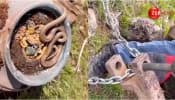London: The husband of Indian dentist Savita Halappanavar, who died after being denied an abortion in Ireland, broke down in tears as he recounted the incidents leading up to his wife`s death during an inquest which opened on Monday.
Praveen Halappanavar explained how his wife asked twice for a termination as she lay in hospital in excruciating pain and broke down in the dock 45 minutes into his statement, which had to be halted by coroner Ciarn McLoughlin to give him time to recover.
"Savita asked for a termination two times. Savita was in tears. She said she could not take it. The doctor did not come back that day," he told the hearing.
According to local Irish media reports, the courthouse was packed to capacity today for the hearing before a jury of six men and four women into the death of 31-year-old Savita who died at Galway University Hospital following a miscarriage last October.
Praveen said he and his wife had asked consultant obstetrician Dr Katharine Astbury for a termination on October 23, 2012, after learning that she was miscarrying at 17 weeks. Astbury told her that "unfortunately" the foetus was still alive.
The couple again asked for a termination the following day.
"She said, `unfortunately, I can`t. This is a Catholic country?," the 34-year-old engineer Boston Scientific in Galway told the inquest.
He said his wife pointed out that she was a Hindu and wasn`t an Irish citizen, but Dr Astbury said sorry and walked away.
Halappanavar`s statement then went on to recount the deterioration in his wife`s health, which resulted in her death on October 28.
As part of his 90-minute statement reported in the `Irish Times`, Praveen Halappanavar related how he met and married Savita and how they travelled to scenic sites around the country and developed a network of friends locally.
"Savita found Ireland so peaceful compared to the hustle and bustle of India," he said, adding they always planned to have a baby in 2013 and were delighted when they found out last July that she was pregnant.
She went to hospital as a result of severe back pain and was told she was miscarrying.
Halappanavar said the last time his wife spoke to him was when she asked if her parents, who had been visiting, had returned safely to India.
The inquest, which is scheduled for a week, is charged with establishing a cause of death.
The coroner confirmed that he had received 67 statements and reports in relation to the death, including 53 statements from hospital staff eight from the police and four from pathologists.
The first witness to take the stand today was Dr Helen Howley who saw Savita ante-natally at her practice in Doughiska, Galway.
Dr Howley said at the 12-week check-up "Savita was as healthy and strong as she could be" and that she and her husband Praveen "were full of the joys and excited about the pregnancy".
The main consultant involved in Savita`s care is likely to give her evidence tomorrow.
Among others called will be midwives, a microbiologist and members of the hospital`s intensive-care team.
The untimely death of Halappanavar, originally from Karnataka, has brought the care provided at the hospital into sharp focus, including the fact that her fatal shivers were attributed to cold rather than a life threatening infection.
Her husband is represented by Eugene Gleeson SC and John O`Donnell during the hearing and the team is not calling expert witnesses although it has commissioned an expert report by London-based obstetrician-gynaecologist, Roger Varley Clements, which it will use for its own guidance.
The final draft of an unpublished Health Service Executive (HSE) report into Savita`s death had found there was an "overemphasis" on the foetus and an "underemphasis" on Savita`s deteriorating health.
The case had triggered worldwide outrage and re-ignited calls to re-define Ireland`s confusing anti-abortion laws, which demands that doctors treat an expectant mother and her unborn baby as equals.
The Irish government has been conducting a review and is committed to legislate and introduce regulations to allow abortion if there is a real and substantial risk to a woman`s life, including the threat of suicide, by July this year.
PTI
Savita`s husband and his solicitor O`Donnell had a
four-hour meeting yesterday with their full legal team in preparation for the inquest, scheduled for a week but likely to continue into next week with the basic remit to establish a cause of death taking into account the circumstances leading up to it.
The coroner is to hear from 16 witnesses involved in Halappanavar`s treatment as well as from his own five expert witnesses, which include a former master of the National Maternity Hospital at Holles Street, Dr Peter Boylan.
The care provided at the hospital will come under sharp focus, including the fact that Savita`s fatal shivers may have been attributed to the cold rather than a life threatening infection.
Praveen Halappanavar will be represented by Eugene Gleeson SC and John O`Donnell during the hearing.
His team is not calling expert witnesses although it has commissioned an expert report by London-based obstetrician-gynaecologist, Roger Varley Clements, which it will use for its own guidance.
The final draft of an unpublished Health Service Executive (HSE) report into his wife`s death presented to him last month had found there was an "overemphasis" on the foetus and an "underemphasis" on Savita’s deteriorating health.
The case had triggered worldwide outrage and re-ignited calls to re-define Ireland?s confusing anti-abortion laws, which demands that doctors treat an expectant mother and her unborn baby as equals.
This constitutional protection for the unborn child places a ban on abortion, but allows medical intervention to save the life of a woman in limited circumstances.
Abortion has been legal in cases where there is a substantial risk to the mother?s life since a 1992 Supreme Court ruling but successive governments have failed to enact legislation to give the ruling full effect.
The Irish government has been conducting a review and is committed to legislate and introduce regulations to allow abortion if there is a real and substantial risk to a woman`s life, including the threat of suicide, by July this year.
PTI















